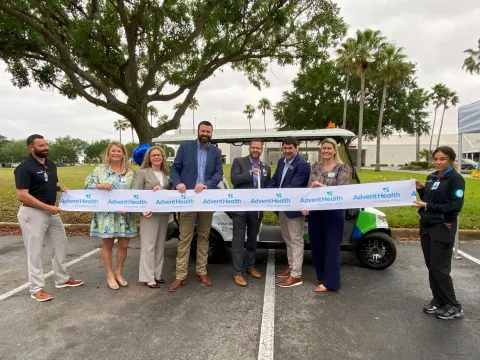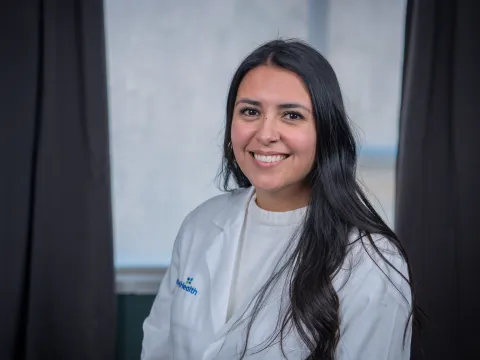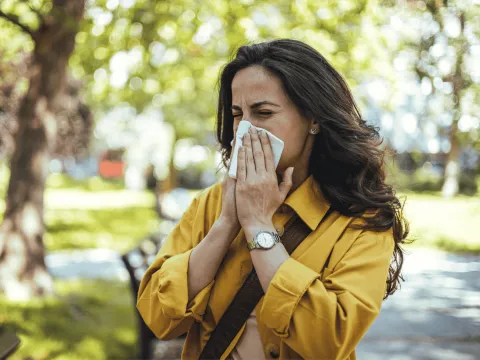- AdventHealth

Since December 2020, we have been hearing reports of a new variant of the coronavirus that causes COVID-19. Additional variants have been identified since and are being closely monitored.
The new variants can bring about even more stress as we continue to navigate the pandemic. Are we more likely to get sick? Will the vaccines work against the variants? Should we do anything differently to keep ourselves and our families safe? These are questions many of us are asking, and AdventHealth is here to help provide answers based on the current information that’s available.
About the Variants
Variants of viruses occur when there is a mutation — or change — to the virus’s genes. Virus mutation is common and not unexpected. For example, because flu viruses change often, doctors recommend a flu shot once a year to protect you. Here is what we know about the COVID-19 variants:
- Alpha: This variant was first detected in the United States in December 2020. It was initially detected in the United Kingdom.
- Beta: This variant was first detected in the United States at the end of January 2021. It was initially detected in South Africa in December 2020.
- Gamma: Gamma was first seen in travelers from Brazil in early January, who were tested during routine screening at an airport in Japan.
- Delta: The delta variant was first detected in the United States in March 2021. It was initially identified in India in December 2020. In the United Kingdom, 99% of COVID-19 cases are currently attributed to the delta variant. This is considered a highly contagious strain.
- Delta plus: The delta plus variant is a mutation of the current delta variant’s spike protein that binds to a cell’s receptors and allows it to enter.
- Lambda: The earliest documented samples of the lambda variant date from August 2020, but it was flagged as a “variant of interest” by the World Health Organization on June 14, 2021. It has been spreading rapidly in South America, particularly Peru. It is more contagious than the Alpha and Gamma variants.
Are the Variants More Contagious?
According to the CDC, these variants seem to spread more quickly and easily than other variants, which may lead to more cases of COVID-19. More cases can lead to more hospitalizations and potentially more deaths.
Are the Variants More Dangerous?
The delta variant may be causing more severe infection in some patients because of its ability to replicate more quickly. As with the original version of COVID-19, the risk is highest for elderly people and those who have significant underlying health conditions. However, a virus being more contagious and just as dangerous will in itself lead to more deaths in unvaccinated populations.
Do the Vaccines Protect Against Variants?
Vaccines offer high protection against serious illness with COVID-19, including infections caused by these variants. They also reduce the risk of becoming infected at all. They don’t eliminate all risk, but they provide the best safety net possible as the variants continue to spread quickly throughout our communities.
Widespread vaccinations reduce the likelihood that the virus will continue to mutate and cause more variants. That’s why it’s so important to get your shot once you’re eligible and encourage your loved ones to do the same.
Keeping You and Your Family Safe from COVID-19
As COVID-19 and its variants continue to circulate, the advice remains largely the same. Follow these steps to help keep you and your family healthy and safe:
- Avoid crowds and poorly ventilated indoor spaces.
- Get a COVID-19 vaccine.
- Stay six feet apart from others who don’t live with you.
- Wash your hands often with soap and water, and use hand sanitizer.
- Wear a face mask that covers your nose and mouth.
At AdventHealth Gordon, your well-being is our number one priority, and we are here for you.
Choose the health content that’s right for you, and get it delivered right in your inbox.
Recent News

Local leaders, officials, and construction workers gathered today to commemorate a major milestone in the expansion underway at AdventHealth Daytona Beach: placing the final steel beam.

AdventHealth is excited to introduce Eugenio L. Menendez, DO, FACP, to our community of care. He is joining the team at AdventHealth Medical Group Family Medicine at Hendersonville* following the...

AdventHealth Heart of Florida and AdventHealth Polk Foundation leaders are delighted to unveil a new courtesy visitor shuttle meant to enhance accessibility and comfort for patients.

Dr. Jeffrey Keen, a board-certified orthopedic surgeon specializing in adult reconstruction, orthopedic surgery, robotic-assisted surgery, and sports medicine, has returned to AdventHealth Medical...

In recognition of National Donate Life Month, nearly 300 transplant patients and their families enjoyed AdventHealth’s 2025 transplant reunion.

By managing ASCs as distinct entities with tailored operations, financial structures, and physician partnerships, the East Florida Division is fostering collaboration, efficiency, and growth.

According to the National Kidney Foundation, more than 101,000 people are currently on the organ transplant list in need of a new kidney. However, only about 17,000 transplants happen each year —...

AdventHealth is excited to welcome Shalom Littrell, LCSWA, to its team at AdventHealth Medical Group Psychiatry at Medical Office Building*. Littrell is a Licensed Clinical Social Work Associate and...

The AdventHealth Heathbrook ER will have 12 exam rooms, including a resuscitation room, a bariatric room, an isolation room, obstetrics-friendly room and pediatric-friendly rooms.

Ming Wu, MD -- a family medicine doctor with AdventHealth Littleton -- talks about the ways to lessen the impact of seasonal allergies this spring.

The East Florida Division is forming strong partnerships with independent physicians, driving mutual success and improving hospital throughput.

In life, Sophie Davis touched dozens of hearts. In passing, one of her organs could possibly save thousands of lives.
